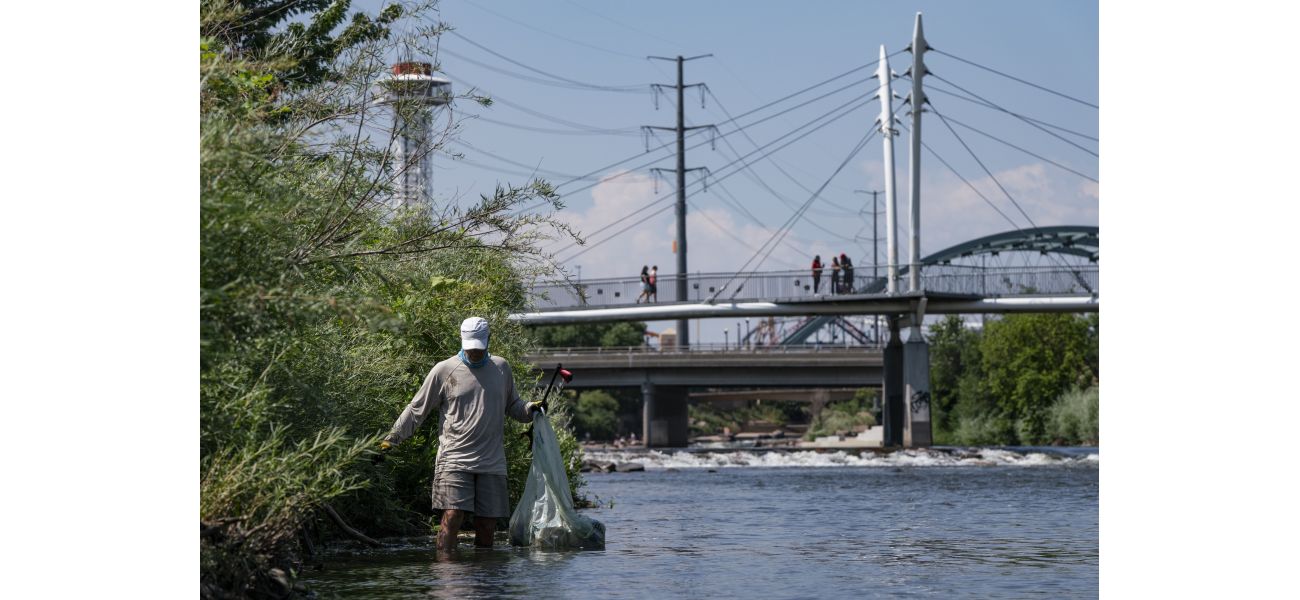Cleaning up Denver's South Platte River for swimming is a difficult task due to various challenges.
Denver's focus on the South Platte River has brought attention to ongoing environmental issues in the water.
September 8th 2024.

As volunteers take on the daunting task of cleaning up Denver's South Platte River, they come across a diverse array of discarded items along its banks. From shopping carts to food wrappers to even guns, the river seems to hold a never-ending supply of abandoned objects. It's not just modern debris either - some of the findings include outdated car phones from the 1990s. Despite efforts to revitalize the river and develop the surrounding areas, water quality remains a major concern. In fact, certain sections of the South Platte still emit a strong odor. Despite former Mayor Michael Hancock's promise to make the river swimmable, city health officials advise against swimming in the water, especially during the summer months.
Jon Novick, the administrator of the Denver Department of Public Health and Environment's water quality program, explains, "If you're looking to go for a swim, your best bet is a swimming pool. It's much safer than the South Platte River." The recent attention on the river from developers, community leaders, and city officials has brought to light the many environmental challenges still facing the South Platte. One of these challenges is the discharge of effluent from wastewater plants into the river. Additionally, companies like Suncor Energy release various substances into the South Platte and its tributaries, including inorganic nitrogen, arsenic, and PFAS compounds known as "forever chemicals." For decades, Denver's health department has been monitoring these contaminants as well as the overall condition of the river. They track water temperature, acidity, nutrients, and metals, but their biggest concern is E. coli bacteria. Novick explains that E. coli can enter the water through animal or human waste, and the city's aging infrastructure means that sometimes sewage leaks into the river. This is compounded by the fact that all of Denver's stormwater eventually makes its way into the South Platte.
During the summer months, when people are most inclined to take a dip in the river, E. coli bacteria multiplies at a faster rate due to the warm water. As the river flows downstream to the north, E. coli concentrations increase. In its most recent water quality report, the DDPHE ranked the South Platte's water quality as "fair," falling between "marginal" and "poor," but still below "good." In 2022, E. coli levels exceeded the Colorado Water Quality Control Commission's standard year-round, and the river also exceeded standards for arsenic, which occurs naturally in the bedrock beneath the city.
On a hot summer day, Victoria Britto seeks relief from the heat by soaking in the cool waters of the South Platte at Confluence Park in downtown Denver. However, the river's pollution is not just caused by industrial and municipal sources. The millions of people who live near the river also contribute to its contamination. Anything that isn't picked up or blown away on Denver's streets and sidewalks eventually ends up in the river - including trash, lawn fertilizers, runoff from roads, pet waste, and oil and grease from vehicles. The Mile High Flood District works with local governments to improve the cleaning of stormwater before it reaches the river. Founded after the devastating 1965 flood in Denver, the district has seen some positive trends in the river's health. Holly Piza, the district's research and development director, explains that nutrients like phosphorus and nitrogen have generally decreased, which is good news for the river's aquatic ecosystem. However, other water quality issues are worsening, such as salinity, which can harm aquatic life and damage infrastructure.
In an effort to mitigate these problems, Denver has implemented bioretention ponds outside the Carla Madison Recreation Center on Colfax Avenue. These ponds help retain water after rainfall and filter it through the soil, rather than allowing it to immediately flow into the river. Novick and Piza urge Denver residents to be more mindful of their actions, such as using fertilizers without phosphorus or nitrogen, avoiding littering, and washing cars at a car wash rather than on the street. Novick acknowledges that while the city is doing its part to improve water quality, they can't be everywhere and do everything. It is up to all residents to take responsibility and help protect the South Platte River. Stay informed on Colorado news by signing up for our Mile High Roundup email newsletter.
Jon Novick, the administrator of the Denver Department of Public Health and Environment's water quality program, explains, "If you're looking to go for a swim, your best bet is a swimming pool. It's much safer than the South Platte River." The recent attention on the river from developers, community leaders, and city officials has brought to light the many environmental challenges still facing the South Platte. One of these challenges is the discharge of effluent from wastewater plants into the river. Additionally, companies like Suncor Energy release various substances into the South Platte and its tributaries, including inorganic nitrogen, arsenic, and PFAS compounds known as "forever chemicals." For decades, Denver's health department has been monitoring these contaminants as well as the overall condition of the river. They track water temperature, acidity, nutrients, and metals, but their biggest concern is E. coli bacteria. Novick explains that E. coli can enter the water through animal or human waste, and the city's aging infrastructure means that sometimes sewage leaks into the river. This is compounded by the fact that all of Denver's stormwater eventually makes its way into the South Platte.
During the summer months, when people are most inclined to take a dip in the river, E. coli bacteria multiplies at a faster rate due to the warm water. As the river flows downstream to the north, E. coli concentrations increase. In its most recent water quality report, the DDPHE ranked the South Platte's water quality as "fair," falling between "marginal" and "poor," but still below "good." In 2022, E. coli levels exceeded the Colorado Water Quality Control Commission's standard year-round, and the river also exceeded standards for arsenic, which occurs naturally in the bedrock beneath the city.
On a hot summer day, Victoria Britto seeks relief from the heat by soaking in the cool waters of the South Platte at Confluence Park in downtown Denver. However, the river's pollution is not just caused by industrial and municipal sources. The millions of people who live near the river also contribute to its contamination. Anything that isn't picked up or blown away on Denver's streets and sidewalks eventually ends up in the river - including trash, lawn fertilizers, runoff from roads, pet waste, and oil and grease from vehicles. The Mile High Flood District works with local governments to improve the cleaning of stormwater before it reaches the river. Founded after the devastating 1965 flood in Denver, the district has seen some positive trends in the river's health. Holly Piza, the district's research and development director, explains that nutrients like phosphorus and nitrogen have generally decreased, which is good news for the river's aquatic ecosystem. However, other water quality issues are worsening, such as salinity, which can harm aquatic life and damage infrastructure.
In an effort to mitigate these problems, Denver has implemented bioretention ponds outside the Carla Madison Recreation Center on Colfax Avenue. These ponds help retain water after rainfall and filter it through the soil, rather than allowing it to immediately flow into the river. Novick and Piza urge Denver residents to be more mindful of their actions, such as using fertilizers without phosphorus or nitrogen, avoiding littering, and washing cars at a car wash rather than on the street. Novick acknowledges that while the city is doing its part to improve water quality, they can't be everywhere and do everything. It is up to all residents to take responsibility and help protect the South Platte River. Stay informed on Colorado news by signing up for our Mile High Roundup email newsletter.
[This article has been trending online recently and has been generated with AI. Your feed is customized.]
[Generative AI is experimental.]
0
0
Submit Comment





